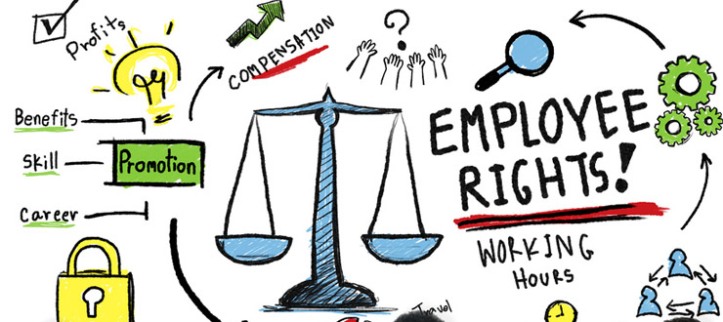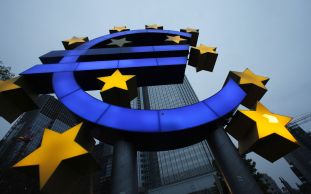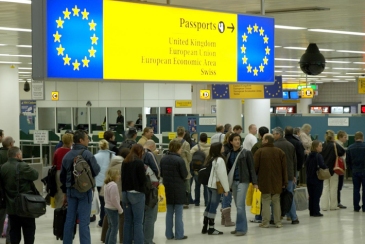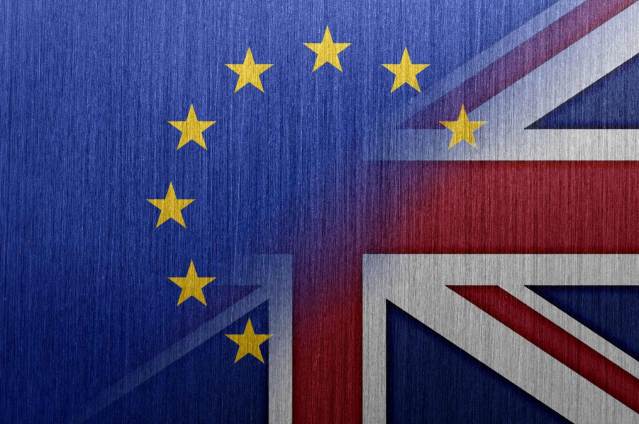A CONVERSATION ABOUT BREXIT
The UK referendum on EU membership is to take place in 2016 or 2017.[2] When the UK public go to the polls to cast such a significant vote, it is vital that they are making as informed a decision as possible.
However, concerning the polarising issues in the EU referendum such as immigration and the economy, accurate and coherent information is rather hard to come by. Indeed, the British media frequently misrepresents the facts or over-simplifies the issues. Professor John Spencer indicates that the reason for this is because newspaper editors “believe the stories to be ‘good ones’, in the sense that they will please their readers and potential readers and therefore make their papers sell.”[3]
See for example:
“Eastern Europeans in the UK ‘earn less and claim more’ than those born in Britain – but migrants from Western Europe, Australia and North America do better”[4] or “EU bans corgi dogs.”[5]

So notorious is the British media for its anti-EU tendencies that the European
Commission even keeps a blog about “euromyths” expounded in the UK.[6] Of course, with some further reading one can discover that headlines like these are either plainly wrong or are somewhat a fudge of the facts. But the reality is, unless you enjoy researching EU law n your spare time or you are in fact employed to conduct such research and analysis, the media is the easiest place to access information and read up on current issues.
Whilst we can speculate as to why the British media has taken this approach to the EU project, the most useful thing for lawyers, academics and those who are fortunate to be in a position to have a more in-depth understanding of EU law and politics to do, is to promote conversation and to help explain the issues to the public without advancing a particular political or newspaper-selling agenda. This way voters can make their decisions based on a more objectively presented EU and not on a “euromyth”. Equally EU experts can gain a lot from these exchanges by viewing the EU from a different and less academic or technical perspective before they cast their own votes.
The remainder of this blog post follows a conversation on economic and social aspects of Brexit between John (an inquisitive prospective voter in the referendum but without expert knowledge on the EU) and Jane (his friend who is an EU law and policy academic). Whilst Jane does not have all of the answers (as many aspects of Brexit are still quite speculative or unclear), the conversation highlights how politicians and journalists are not the only ones who should be heard in the Brexit debate. Legal and policy experts on the EU should also be engaging with voters in a more visible and frequent manner in the run up to the referendum.
John: I have been thinking about the EU referendum and I think I am going to vote to leave.
Jane: I see. What do you mean when you say you want to leave the EU?
John: I don’t understand.
Jane: Well, if you want to leave, what exactly do you think that will look like? What relationship do you want the UK to have with the EU moving forward?
John: Oh, well, I hadn’t thought that far ahead.
Jane: Don’t you think if you vote to leave, you should have an idea of what is on the other side? The UK’s political and economic stability depends on it.
John: Yes, I suppose so.
Jane: I don’t blame you for being a bit foggy on that issue. As it stands, it is not clear at all how the UK would interact with the EU post-Brexit.
Following a “leave” vote in the referendum, the UK and the EU will enter into negotiations to determine their future relationship.[7] There are 5 possible alternatives that are being discussed:[8]
The Norway option: the UK would leave the EU but would become a member of the European Economic Area (“EEA”). Under this option the UK would have full access to the single market in most areas.[9] However, in those areas it would still be subject to EU regulatory standards but would not have a voice or a vote in the EU democratic or legislative processes. The UK would also still have to make a substantial contribution to the EU budget[10] and would be unable to impose immigration restrictions on EU nationals as the EEA Agreement encompasses free movement of persons just like the EU Treaties.[11] Furthermore, the UK would be under the jurisdiction of a Court in Luxembourg, namely, the European Free Trade Association court (“EFTA court”).
The Switzerland option: the UK and EU would establish a series of bilateral agreements which govern UK access to the single market in specific sectors. One of the sectors likely to be subject to a bilateral agreement is the free movement of persons. The EU Commission is unlikely to accept a deal where the UK gains access to the single market in goods and services but excludes persons. Again, the UK would have to follow EU regulation in the sectors covered and there may be certain sectors where the UK is unable to secure a deal with the EU. However, the Commission and Member State governments are increasingly frustrated with the Swiss arrangement, which involves constant renegotiation when EU legislation changes or evolves. Therefore, it may not be possible for Britain to have a similar deal to the Swiss one.
The Turkey option: the UK would enter into a customs union with the EU. In other words, the UK would not have to pay customs tariffs for goods moving between the UK and EU territory. However, this means that the UK would still have to adopt many EU product market standards and abide by EU regulations. Furthermore, the UK would have to apply the EU external tariff rate to non-Member States of the EU. The external tariffs would be decided in Brussels and the UK would have no input in this decision.
The Free Trade Agreement (“FTA”) option: the UK would be free to agree FTAs independently and the UK’s relationship with the EU itself would be governed by an FTA. Customs tariff barriers with the EU would be unlikely under this option but as with all FTAs, there will be a trade off between depth (namely agreeing common standards and regulations for full access to markets) and independence.[12] Thus a sufficiently comprehensive FTA with the EU would more than likely require the UK to comply with EU standards and regulations.
Complete withdrawal: the UK and EU’s trading relationship would be determined according to the WTO’s Most Favoured Nation criterion. Under this model there would be no need to agree common standards and regulation. But the UK would ace the EU’s common external tariff. For example, food imports are subject to an average EU tariff of 15% and car imports face a 10% tariff.
 Within each of these options there are positives and negatives for the UK. However, they reveal a tension between the UK’s policy independence on the one hand and the economic benefits of being included in the EU single market, on the other. The more policy independence the UK would gain upon Brexit, the more economic damage it is liable to suffer.[13]
Within each of these options there are positives and negatives for the UK. However, they reveal a tension between the UK’s policy independence on the one hand and the economic benefits of being included in the EU single market, on the other. The more policy independence the UK would gain upon Brexit, the more economic damage it is liable to suffer.[13]
John: Oh yes, I see. That makes this all the more confusing then.
Jane: Yes, exactly. But being aware of these subtleties is a good thing. It means that we can see the complicated picture for what it is and we are aware of the many interlinked issues that Brexit would impact.
John: But I think if the UK leaves, there will be much less red-tape affecting UK businesses and producers. And surely that will be a boost for our economy?
Jane: Again, I think this depends on the relationship between the EU and the UK. Under the Norway, Switzerland and the FTA options I just mentioned, the UK would still have to comply with EU regulations and standards.
In fact, it would be in the interests of British manufacturers to continue to comply with EU product standards in order to be able to sell their goods in the EU without having to comply with several sets of product standards – one for the UK market, another for the EU market and then again others for the global markets.
Furthermore, the EU is not the sole actor responsible for regulation. The UK itself chooses to “gold-plate” certain standards to make UK regulation better and more robust than the minimum standards required by the EU.[14] For example, The UK Agency Workers Regulations 2010 grant temporary workers greater rights than EU law requires.[15]
I also don’t want to constantly make excuses for EU regulatory standards as if they are an inherently bad thing. EU regulation has done a lot of good things for you and me. This year, the EU Parliament and the Council reached an agreement to end data roaming charges which will make it much cheaper for you and me to make calls and use the Internet wherever we are in the EU.[16]
John: Oh yes, I remember reading about this in the summer. But I didn’t really think of it in the context of Brexit.
Jane: There are also important EU Directives on employment law such as in the areas of race and sex discrimination[17] and the transfer of undertakings.[18] These are generally recognised as doing good things for employees and employers and even in the event of Brexit, it is unlikely that the UK would want to repeal such legislation at the UK level.[19]
Furthermore, many regulations are intended to create the level playing field the single market requires and to make it easier for UK manufacturers and service providers to sell their products and provide their services in other EU countries.[20]
According to UK government impact assessments the 100 most expensive regulations cost the UK economy £27.5 billion each year, whereas the benefits total £57.1 billion.[21] That is not to say that certain EU regulations are more costly than they should be.[22] However, the only way the UK will be able to effect change in these areas is to be involved in policy making at an EU level. Brexit will prevent the UK from doing that and yet under many of the models the UK will still have to abide by EU regulatory standards.
Professor Catherine Barnard has also remarked that when the EU legislates, it legislates for a good reason. For example, to protect the environment or to protect the consumer – these are interests that a UK government of whatever political colour would share with the EU. And so it may be that EU red tape is merely replaced with British red tape at considerable financial cost to the British people.[23]

John: Yes, ok. I see what you mean regarding regulation. Perhaps leaving the EU may not completely solve that problem. But I think if the UK left, in theory it would be able to organise its trading policies as it sees fit. It could negotiate Treaties in its own right with many countries beyond the EU.
Jane: As with everything in this debate, this revolves around the model the UK adopts upon exiting the EU and the key phrase in your comment is “in theory”.
Not surprisingly, this is also a very complicated issue. In fact, economists are finding it extremely difficult to find a reliable way to predict and assess how the UK’s trading position would be affected in certain numerical terms.[24] So I do not propose to try and give you particular estimates or figures.
Wrapped up in your question are two distinct issues. First the UK’s future trading position with the EU and secondly the UK’s trading position with other economies such as China and the USA.
Turning first to the UK’s trade position with the EU:
There is a high level of economic integration between the UK and the EU. And it is clear that the UK economy is more dependent on the EU than the EU is on the UK. Only 10% of EU exports are to the UK. On the other hand in 2014, the EU accounted for 44.6% of UK exports of goods and services.[25] It was also estimated that the EU boosted UK trade with other EU Member States by £130 billion in 2013.
These figures demonstrate that trade with the EU is a vital source of UK income and furthermore that the UK will not necessarily have much leverage when negotiating a trade deal with the EU if it decided to leave.
Turning next to the UK’s trade position with other economies:
The UK will also have less leverage and will be a lower priority trade partner than the EU for the major economies. The EU’s imports from China are seven times larger than the UK’s.[26] Following Brexit the UK would hold a 4.3% share in global trade whereas the EU would hold 15.4%. So, for many countries, negotiating a free trade deal with the UK would not be as important as an FTA with the EU, given the difference in market size. This is all the more so given that the EU has much more experience in negotiating deep and comprehensive trade agreements than the UK does as a sole actor.
Indeed President Obama’s most senior trade official said that America is “not in the market” for a free trade deal with Britain alone. As a result, the UK would face (unlike the EU) the same tariff barriers as China, Brazil and other countries without a free trade partnership with the US.[27] This would be devastating to UK trade as the US is the UK’s largest exporting country or region after the EU.
Not only that, but the EU will also be less attractive without the UK. The UK has driven a lot of EU trade liberalisation and has been instrumental in launching negotiations with large economies outside the EU such as the USA and China.[28]
Trade in goods is not the only thing that will be affected, but also financial services – a key sector in the UK economy which provides 3.9% of jobs and 7.9% of GDP in the UK.
John: Yes, but London is such a hub for financial activity. That is going to be pretty difficult to uproot and change. Even though the UK is outside the Eurozone, London has thrived as a financial centre in the EU.
Jane: Yes, admittedly, the City of London is unlikely to collapse in the immediate aftermath of Brexit.

However, Eurozone leaders would prefer to have euro-denominated wholesale banking taking place under their watch and the watch of the ECB, rather than in London. After Brexit the UK would no longer be protected by the CJEU’s enforcement of single market rules, which can work in the UK’s favour in the financial services context. For example, in the past the CJEU has ruled that the ECB does not have competence to require clearing houses specializing in Euro-denominated trading to relocate to the Eurozone.[29]
The UK might also suffer an opportunity cost from being absent from future liberalising initiatives by the EU, which could open up new markets in new areas.
Related to financial services is the UK’s position as the largest recipient of foreign direct investment. Brexit could reduce the attractiveness of the UK as a gateway to the rest of Europe. Corporate headquarters are likely to consider other cities such as Dublin, Frankfurt, Paris and Amsterdam if the UK left the EU.
What is more, the whole “Brexit” process is likely to last 10 years. That is 10 years of uncertainty for business, which is likely to impact investment decisions with serious economic consequences.
John: What do you mean it will take 10 years? Once we vote we’re out!
Jane: The referendum, as you know, will be held in 2016 or 2017. If the referendum resulted in a “leave” vote then the UK will first have to negotiate a “divorce settlement” with the EU. Under Article 50, TFEU there is a two year time limit on negotiation of the settlement. The final vote on the divorce settlement will be taken by the European Parliament, which further reduces the UK’s bargaining power in negotiations.
If the UK were to follow a Swiss or an FTA model upon leaving the EU, then there would be even more uncertainty after that as the UK would subsequently have to negotiate further agreements in specific sectors to guarantee market access in those areas.
These protracted negotiations are certainly going to impact business and investor decisions.
John: Yes, but what about immigration. I really feel that the UK has an unfair deal. It cannot be denied that the UK is one of the most economically attractive and socially liberal societies in the EU. The concept of free movement of citizens and workers has an unfair impact on the UK. There are far more people who want to come here, take our jobs and benefits than Britons who want to leave. There just is not enough room.
Jane: Yes, I am aware that this is a very politically sensitive point and will be a particularly important factor in any referendum.
 However, this is one area where the media have great culpability in skewing the facts. And really this is a point that must be understood on the basis of facts rather than prejudices.
However, this is one area where the media have great culpability in skewing the facts. And really this is a point that must be understood on the basis of facts rather than prejudices.
First, statistically speaking, the majority of immigrants in the UK do not come from the EU. In 2015, 636,000 people immigrated to the UK. 286,000 of those came from outside the EU whereas 265,000 were EU citizens.[30] According to these figures it does not seem fair to place the blame solely on the EU for the high levels of immigration to the UK.
Secondly, under several of the Brexit models, the UK would still be required to permit the free movement of persons such as under the Norway or Switzerland options.
Thirdly, there is very little evidentiary support for the argument that Central and Eastern Europeans are damaging the employment prospects of Britons. In fact, academic research has shown that overall, immigrants have a very small impact on British wages.[31] So that in itself really should not be a major reason to vote to stay or leave the EU. And all Eastern Europeans are not low-skilled workers. There are many highly skilled and educated workers from Central and Eastern Europe who raise British workers’ productivity and hence their wages.
Fourthly, EU immigration is also good for public finances. Immigrants pay more in taxes than they receive in public spending.[32] This helps Britain deal with the costs of an ageing population by replacing retiring workers and raising more taxes to pay for health and pension costs. So if the UK left the EU, the UK government would have to raise taxes or make further cuts to the welfare state to compensate for the taxes paid by immigrants.
John: But I get the impression that a lot of immigrants come here and just live off benefits. I have a real problem with that.
Jane: Well yes, I have a problem with that too. But that is really not the whole picture.
When talking about an immigrant who comes to the UK to work, they are entitled to social support from the UK’s welfare system.[33] But bearing in mind that these immigrants pay their taxes just like you and me, they should be entitled to social support from the state because they have paid their way. Don’t you agree?
John: Well sort of. But I don’t agree with migrants being able to come to the UK, start working in a low paid job and being able to claim in-work benefits immediately. They have not paid any taxes at that point.
Jane: Ok, yes I see your point here. In-work benefits has become a focal point of David Cameron’s negotiations with other EU leaders. His current proposal is to prevent migrants from claiming in-work benefits until they have resided/paid taxes in the UK for 4 years.
Whilst the resolution of this is still unclear, what I can say is this: a residency requirement is likely to be regarded as directly discriminatory if it targets migrants alone, or indirectly discriminatory if it applies to everyone, because it will impact migrants more than UK citizens. This would be a prima facie breach of EU[34] unless the UK were to prevent UK citizens, who have not started paying taxes (such as students or ex-pats returning to the UK), from claiming the same benefits for 4 years.
John: But this is precisely why it might be better to leave the EU, so that our own citizens, especially young people, would not have to be deprived of benefits for the sake of staying in the EU.
Jane: I would stress however John that under many of the Brexit models such as Norway and Switzerland, discrimination on the basis of nationality would not be tolerated either. So Brexit would not necessarily solve this problem.
And I would urge you not to be too alarmed by this issue. The UK government, as yet, has produced no evidence in-work benefits acts as a magnet to migrants come to the UK. The more logical understanding of migration to the UK is because the labour market is more attractive. Sir Stephen Nickell of the Office for Budget Responsibility has stated that changes to benefits are unlikely to curb migration to the UK because it is the job market rather than benefits which is attractive to migrants.[35] So it would not be sensible to vote to leave the EU on an issue which is currently unsubstantiated.
John: But I read all the time about people who come to the UK just to get benefits and they don’t want to work.
Jane: Well I am afraid that if that happens in the UK, it is nothing to do with the EU.
EU law is very clear that an immigrant who does not work and is not looking for work[36] cannot just walk into the UK on Monday and claim benefits on Tuesday. They have never been allowed to do that. Under EU law, for the first 3 months that an immigrant is in the UK, they cannot claim social assistance.[37]
Where an immigrant resides in the UK for longer than 3 months, they must fulfill various conditions in order to benefit from EU residence rights. One of those conditions is that they must not become an unreasonable burden on the social assistance system of the UK.[38] This means that immigrants who do not have a job and do not intend to get a job, cannot use the UK benefit system to fund their subsistence under EU law. The CJEU has stated this quite clearly.[39]
Where an immigrant has legally resided in the UK and has fulfilled the conditions required by EU law (one of which, as stated above, is that they are not an unreasonable burden on the social assistance system of the UK) for more than 5 years, they gain permanent residence in the UK. Only at that point would it be possible for an immigrant to claim benefits in the UK on exactly the same basis as UK citizens. That is because after 5 years, they are regarded as integrated into the UK’s society and should thus be entitled to social support in the same way as UK citizens. However, this kind of situation is probably an unusual state of affairs where the immigrant or one of their family members has never been economically active in the UK.
And what about British citizens benefiting from the EU? For example, going on holiday, retirement or owning a second home on the Mediterranean?
John: Yes, my brother has a house in the south of Spain. But why would he be affected by Brexit?
Jane: Well if the UK left the EU, all of us would have to take the good with the bad.[40]
 Unless the UK permitted the free movement of persons, we would no longer be able to be fast-tracked through airports at the border. We should expect to be questioned more intrusively at EU borders about the purpose of our visits, our level of income and our intention to return to the UK.[41] Though unlikely, it may even be necessary for UK citizens to have a visa when going on holiday in the EU! And if a UK citizen fell sick whilst on holiday in an EU country, depending on the exit settlement reached by the UK, he or she may no longer be entitled to access emergency health care which is currently provided for under EU law.[42]
Unless the UK permitted the free movement of persons, we would no longer be able to be fast-tracked through airports at the border. We should expect to be questioned more intrusively at EU borders about the purpose of our visits, our level of income and our intention to return to the UK.[41] Though unlikely, it may even be necessary for UK citizens to have a visa when going on holiday in the EU! And if a UK citizen fell sick whilst on holiday in an EU country, depending on the exit settlement reached by the UK, he or she may no longer be entitled to access emergency health care which is currently provided for under EU law.[42]
Furthermore, there are currently 2 million British people living abroad in the EU. As you know, retiring to hotter climes is popular among British citizens. The status of these people would become very uncertain following a vote to leave the EU and during the exit negotiation process. For example, they may lose their right to reside, their right of equal treatment under EU law, their right to work or be able to access benefits in other Member States.[43]
Those who would like to move in the future from the UK to work or live elsewhere in the EU could face stricter residence and work permit rules. They would no longer be able to move with ease to set up a business or work in another Member State of the EU.
And as for your brother’s house, several of the Brexit models I outlined earlier may make it more difficult for those with existing homes in EU countries and those looking to buy in the EU. UK citizens may be subject to heavier property taxes which they are currently protected from under EU laws on the free movement of capital. Britons may also encounter greater difficulties obtaining mortgages for their EU holiday homes and face higher interest rates on mortgage loans. This is because they could be viewed as “risky borrowers” as they would no longer be citizens of an EU Member State.[44]
So there are real losses and inconveniences that normal people like you and me would suffer if we left the EU.
John: Yes, I see what you mean. But I just don’t like being controlled by courts that are not in the UK. I want to bring control of our laws and human rights back home.

Jane: First, human rights judgments under the ECHR come from Strasbourg and have nothing to do with the EU. I’m sure you have seen the Conservative government discussing the possible repeal of the Human Rights Act 1998. But this is a different issue from the UK leaving the EU. In fact, the EU Court in Luxembourg has emphasized that the EU is an autonomous legal order and one that is entirely distinct from the ECHR.[45]
Although your confusion is not that surprising when you see headlines in the news such as:
“If We REALLY Want to Escape the Group of Human Rights Law. We Must Quit the EU.”[46]
But it is important to remain clear that the EU and Brexit is not the same as the ECHR and HRA repeal. There is a lot of user-friendly information, if you are interested in reading more about that.[47]
Second, under the Norway option we would still be controlled by a foreign court in Luxembourg, namely the EFTA court.
Third, when you live in a globalised society where you want to trade freely with other countries it is important to have an independent court to oversee that everyone plays by the rules. Indeed, the CJEU in Luxembourg has been a source of protection for UK interests.
John: Well, this conversation has definitely given me some food for thought. Perhaps I’m not so decided after all.
Jane: The most important thing is that you are thinking hard about your decision. I’m hoping everyone else will do the same!
What this conversation shows is that EU experts have an important role to play in this referendum. Engagement with the general public should not come purely from politicians or journalists, who are often advancing their own agendas. It demonstrates that people like Jane have a role to play in making the objective facts about Brexit clear and highlighting areas which are still not so clear. By doing so, voters can understand exactly what they are voting for and can make a more informed and ultimately better decision at the polling stations.
FOOTNOTES:
[1] Chambers of AG Bobek, CJEU. BA (Cantab), LLM (Michigan), BPTC (City). All views expressed in this piece are my own. They in no way reflect the views of the institution at which I am employed.
[2] It appears more likely that the vote will take place in May/June 2016 according to opinion polls. http://www.theguardian.com/politics/2015/may/11/david-cameron-european-union-referendum.
[3] J R Spencer, “Who’s Afraid of the Big, Bad European Public Prosecutor?” (2011-2012) CYELS 363, pg 379.
[4] http://www.dailymail.co.uk/news/article-3168884/Eastern-Europeans-UK-earn-claim-born-Britain.html, 20 July 2015.
[5] http://news.bbc.co.uk/2/hi/europe/6481969.stm.
[6] http://blogs.ec.europa.eu/ECintheUK/category/euromyths/.
[7] Article 50, TFEU.
[8] See more extended explanations in “The Economic Consequences of Leaving the EU: The Final Report of the CER Commission on the UK and the EU single market” pg 30 et seq.
See also, Law in Focus, University of Cambridge, Professor Catherine Barnard, What Would Brexit Mean for Free Movement? https://www.youtube.com/watch?v=FRZEuL9KNqc.
[9] One area where the UK would not have access to the single market under this option would be the Common Agricultural and Fisheries policies. So the UK would be subject to tariffs in areas covered by those policies and there would be administrative costs in determining which tariffs would apply to the UK under these policies.
[10] Norway is the tenth largest contributor to the EU budget.
[11] http://www.efta.int/eea/policy-areas/persons/persons.
[12] http://www.global-counsel.co.uk/system/files/publications/Global_Counsel_Impact_of_Brexit_June_2015.pdf, pg 6 (“Global Counsel Report).
[13] Global Counsel Report, pg 14.
[14] Whilst the Conservative Government has claimed to have stopped gold-plating legislation, there are still many UK statues in force that gold-plate EU standards.
[15] The UK legislation granted temporary workers the right to performance-related bonuses which was not required by the UK legislation.
[16] http://europa.eu/rapid/press-release_IP-15-5265_en.htm.
[17] See Council Directive 2000/78/EC of 27 November 2000 establishing a general framework for equal treatment in employment and occupation.
[18] Council Directive 2001/23/EC of 12 March 2001 on the approximation of the laws of the Member States relating to the safeguarding of employees’ rights in the event of transfers of undertakings, businesses or parts of undertakings or businesses.
[19] See, Law in Focus, University of Cambridge, Professor Catherine Barnard, Brexit and EU Social Policy: What has the EU done for me? https://www.youtube.com/watch?v=FRZEuL9KNqc.
[20] Global Counsel Report, pg 14.
[21] http://openeurope.org.uk/intelligence/britain-and-the-eu/100-most-expensive-eu-regulations/.
[22] For example the Energy Performance of Buildings Directive, according to Open Europe, is said to be more costly than beneficial to the UK in its current form.
[23] Law in Focus, University of Cambridge, Professor Catherine Barnard, What Would Brexit Mean for Free Movement? https://www.youtube.com/watch?v=FRZEuL9KNqc.
[24] See Oxford Economics Report, http://www.oxfordeconomics.com/Media/Default/landing-pages/mailing/BREXIT_Proposal.pdf.
[25] Office for National Statistics, http://www.ons.gov.uk/ons/rel/international-transactions/outward-foreign-affiliates-statistics/how-important-is-the-european-union-to-uk-trade-and-investment-/sty-eu.html.
[26] http://www.cer.org.uk/sites/default/files/smc_final_report_june2014.pdf, pg 36.
[27] Michael Froman, http://www.reuters.com/article/us-britain-eu-usa-idUSKCN0SM2LS20151028.
[28] The UK was one of the strongest advocates of the Transatlantic Trade and Investment Partnership, see Global Counsel report, pg 23.
See Case T-496/11 UK v ECB in which the EU General Court ruled that the ECB did not have competence to require clearing houses to move to the Eurozone.
[30] Office for National Statistics, November 2015 Report: http://www.ons.gov.uk/ons/rel/migration1/migration-statistics-quarterly-report/november-2015/stb-msqr-november-2015.html#tab-Immigration-to-the-UK.
[31] See http://www.migrationwatchuk.org/briefing-paper/235, at point 5.
[32] https://www.ucl.ac.uk/news/news-articles/1114/051114-economic-impact-EU-immigration.
[33] Access to some benefits can depend on the amount of time the worker has been paying contributions.
[34] Article 45(2), TFEU.
[35] Speaking to House of Commons Treasury Committee, 15th December 2015.
[36] Admittedly the situation of first time job-seekers is not entirely clear at the EU level. But as far as UK law is concerned they are not entitled to income based job-seeker’s allowance for the first 3 months of their residence in the UK: https://www.gov.uk/government/news/eu-jobseekers-barred-from-claiming-universal-credit. Whether or not this is in compliance with EU law remains to be seen.
[37] Article 24(2), Directive 2004/38/EC, commonly known as the Citizens’ Rights Directive. See also recent reaffirmation of this in Case C-333/13 Dano, at [70]. See also C-67/14 Alimanovic in which the CJEU stated that EU Member States are not obliged to allow unemployed migrants from other EU countries access to non-contributory social benefits, even if they have been previously employed for a short period of time.
[38] Article 7(1) and 14(2), Citizens’ Rights Directive.
[39] Case-333/13 Dano, at [78].
[40] See comments by Professor Steve Peers: http://www.theguardian.com/politics/2015/jun/07/what-will-happen-if-uk-leaves-eu-ten-ways-life-could-change.
[41] See blog post by Professor Steve Peers, “What happens to British expatriates if the UK leaves the EU?” http://eulawanalysis.blogspot.co.uk/2014/05/what-happens-to-british-expatriates-if.html.
[42] The European Health Insurance Card gives access to medically necessary, state-provided healthcare during a temporary stay in any of the 28 EU countries, Iceland, Lichtenstein, Norway and Switzerland, under the same conditions and at the same cost (free in some countries) as people insured in that country.
[43] Law in Focus, University of Cambridge, Professor Catherine Barnard, What Would Brexit Mean for Free Movement? https://www.youtube.com/watch?v=FRZEuL9KNqc.
[44] http://www.telegraph.co.uk/finance/personalfinance/11903509/Brexit-what-would-it-mean-for-your-EU-holiday-home.html.
[45] Opinion 2/13, delivered by the CJEU on 18th December 2014.
[46] Daily Mail, 15th May 2006.
[47] http://rightsinfo.org/what-is-the-european-convention-on-human-rights-and-why-does-it-matter/.
